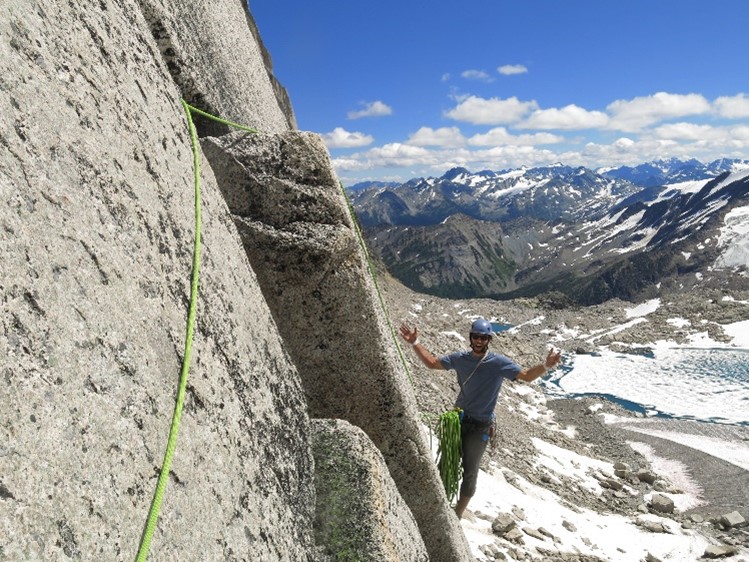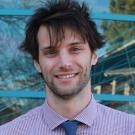
William Putnam: engineering electron-photon interactions at extreme scales
By Rachel Steere
Assistant Professor William “Billy” Putnam joined the UC Davis Department of Electrical and Computer Engineering in November 2018. His area of research is in optics and photonics. Specifically, he works on understanding and controlling electron and photon interactions at ultrafast timescales and ultrasmall spatial dimensions.
“I find it very exciting to build things that can do stuff that has never been done before. Over the past few years, colleagues and I have been developing chip-scale devices that can control electrical currents at unimaginably fast timescales. Pushing this ultrafast frontier has been thrilling, and dreaming up futuristic sensors and detectors that we could build out of this technology has been equally exciting,” said Putnam.
Putnam and his research group are currently studying how short pulses of laser light can manipulate electrical currents in nanoscale devices. Recently, they have shown that when ultrafast laser pulses interact with a nanoscale optical antenna, electrical current bursts of only around one femtosecond (10-15 seconds) can be produced. They are leveraging these ultrafast electrical currents to build detectors that can sample infrared electromagnetic fields in the same way conventional oscilloscopes sample lower frequency electromagnetic signals.
“Infrared detectors are of tremendous importance for spectroscopic technologies in medical, industrial and scientific applications. Our ‘field-sampling’, or ‘field-resolving’, detectors offer unparalleled sensitivity and speed, and we’re hoping that these detectors can revolutionize infrared spectroscopy,” said Putnam.
They are also studying how beams of electrons, traveling over carefully-designed nanostructures, can generate light. These devices resemble tiny free-electron lasers and can produce radiation in conventionally hard-to-reach portions of the electromagnetic spectrum. With the ability to potentially produce high-power terahertz and infrared radiation, these new light sources may have many exciting applications from spectroscopy and sensing to micro-surgery.
Putnam received his B.S. in electrical engineering and physics, and his M.S. and Ph.D. in electrical engineering from the Massachusetts Institute of Technology. After completing his Ph.D., Putnam took a postdoctoral position at the Center for Free-Electron Laser science in Hamburg, Germany. Following his postdoctoral work, he moved to Northrop Grumman’s basic research facility NG-NEXT. After a few years in NG-NEXT, he found himself missing academic research, and he joined UC Davis.
Now, Putnam teaches three undergraduate courses: Circuits II, Electromagnetics I, and Electromagnetics II. He also teaches one graduate course, Ultrafast Photonics. He designed this course last winter, and the department offered it to a multidisciplinary collection of graduate students from four different departments.
His interest in teaching came from his interest in research.
“In research, we’re trying to discover answers to all kinds of exciting questions. In teaching, we’re similarly trying to discover answers, but to a different question: how can I bring these students to understand a concept?” said Putnam. “Beyond this curiosity, I’ve always been drawn to teaching on account of my personal experiences as a young adult. I was very fortunate as a young person to have a couple of incredible teachers. These teachers really affected the trajectory of my life, and I’ve always hoped that I might grow into a similarly impactful teacher.”
Putnam was recognized with a Best Teaching award earlier this year for his strong commitment to the mission and vision of the College of Engineering and for consistently performing above and beyond to train and create the next generation of engineers and leaders.
“It felt terrific to receive a Best Teaching award!” said Putnam. “When I started at Davis, I felt equipped to do research, but I was a little concerned about teaching. I put a lot of effort into developing my course materials, lecture notes and delivery methods, and it feels very nice to have those efforts appreciated.”
 Outside of work, Putnam enjoys spending time outdoors and working on puzzles.
Outside of work, Putnam enjoys spending time outdoors and working on puzzles.
“Once upon a time I felt like my time was almost evenly divided between science and the outdoors. Nowadays, I’m working much, much more than I am getting outside, but I still find time to make a trip to the mountains each month,” said Putnam. “Out in the mountains, I love hiking and rock climbing. Beyond my outdoor hobbies, I also love everything puzzle-related; for most of my life I’ve been a mathematical puzzle nut, but recently I’ve become enamored with crossword puzzles.”

